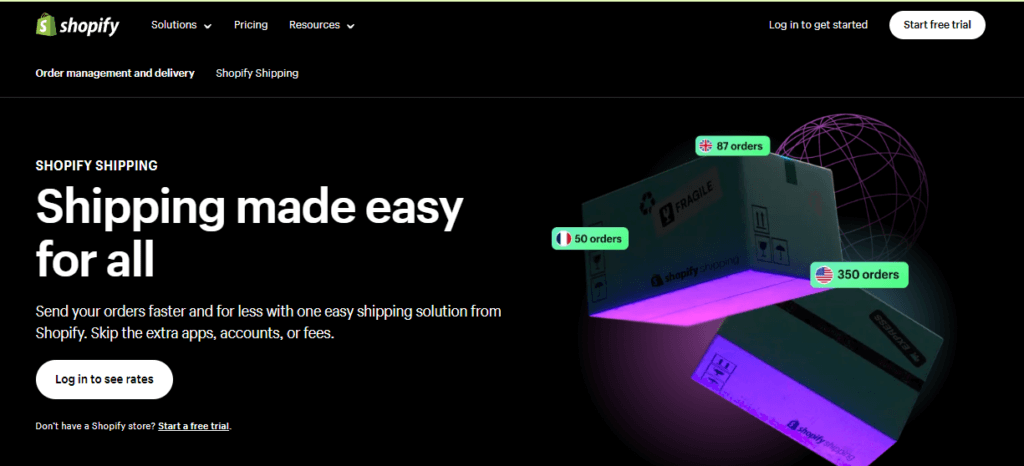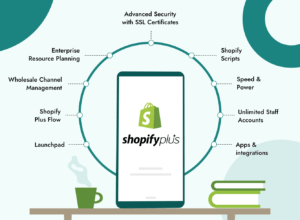In today’s digital age, e-commerce has become a critical component of successful businesses. With the increasing demand for online shopping, choosing the right e-commerce platform is essential for ensuring a seamless shopping experience for customers.
Two popular options in the market are Shopify and Shopify Plus.
Shopify is a leading e-commerce platform suitable for small to medium-sized businesses, while Shopify Plus is designed specifically for larger enterprise-level businesses with high scalability requirements.

In this blog, we will explore the key differences between Shopify vs Shopify Plus to help you make an informed decision for your business.
I. Shopify
Shopify is a versatile and user-friendly e-commerce platform that has gained immense popularity among small and medium-sized businesses.
Features and functionalities of Shopify that benefit small and medium-sized businesse:
- User-friendly interface: Shopify offers a straightforward and intuitive interface, making it easy for businesses to set up and manage their online stores without technical expertise.
- Customizable themes: With a wide range of professionally designed themes, Shopify allows businesses to create a visually appealing and personalized online store that reflects their brand identity.
- Mobile optimization: Shopify provides mobile-responsive themes, ensuring your online store looks and functions seamlessly across devices, offering a convenient shopping experience for customers on smartphones and tablets.
- App store integration: Shopify’s extensive app store offers a plethora of third-party integrations, enabling businesses to enhance their online store’s functionality with additional features such as marketing tools, customer support, and more.
- Cost-effective: Shopify’s pricing plans are budget-friendly and scalable, making it an affordable option for small and medium-sized businesses looking to launch an online store.
- Security and reliability: Shopify provides robust security measures, including SSL encryption, automated backups, and PCI compliance, ensuring your customers’ sensitive data is protected.
Limitations and potential considerations:
- Limited customization: While the platform offers a degree of customization, Shopify can be somewhat restrictive when it comes to deeply modifying certain aspects of your online store’s design and functionality.
- Advanced features: Shopify may not provide all the advanced features that larger enterprises or high-volume businesses might require. Some businesses may find certain functionalities lacking for their specific needs.
- Transaction fees: Depending on the payment gateway you choose, Shopify charges transaction fees for each sale made through their platform. This cost should be considered when evaluating the platform’s overall affordability.

II. Shopify Plus
Shopify Plus is a premium version of Shopify, designed for larger enterprises and businesses with high-volume sales.
Advanced features and capabilities of Shopify Plus that benefit larger enterprises and high-volume businesses:
- Scalability: Shopify Plus can effortlessly handle high-volume sales, traffic, and unlimited product listings. Its cloud-based infrastructure allows for quick loading times, ensuring a smooth shopping experience for customers, even during peak traffic periods.
- Customization: Unlike Shopify, Shopify Plus offers access to advanced customization options, allowing businesses to create customized themes, add unique features, and integrate complex functionality.
- Priority Support: Shopify Plus comes with dedicated support, providing businesses with around-the-clock assistance for technical issues and problems.
- Integrations: Shopify Plus offers greater flexibility with third-party integrations, with access to additional APIs and custom integrations to enhance the functionality of the online store.
- Enhanced security: Shopify Plus provides a higher level of security and compliance, including Level 1 PCI DSS compliance, SSL encryption, and more.
Drawbacks and potential considerations:
- High cost: The pricing structure for Shopify Plus can be significantly higher than that of Shopify, and the platform requires an annual subscription fee. The cost can be a significant barrier to smaller businesses looking to upgrade to the premium platform.
- Limitations in integration: While Shopify Plus offers greater flexibility with third-party integrations, some integrations may be limited, which could impact functionality for businesses with more complex requirements.
- Complexity: While the additional features and customization options are useful, they can also add complexity to the platform, making it more challenging to manage and requiring more expertise and technical knowledge.
III. Feature Comparison: Shopify vs Shopify Plus
When comparing Shopify vs Shopify Plus, it’s important to look at their key features and understand the differences between the two platforms.
Here is a comparison of some of the main features between Shopify vs Shopify Plus, including customization options, scalability, and performance capabilities.
Customization options between Shopify vs Shopify Plus:
- Shopify: With regular Shopify plans, you have access to a wide range of customizable themes and the ability to customize the appearance and layout of your online store. You can also modify the HTML, CSS, and JavaScript code to personalize your site. Shopify offers a robust app marketplace with numerous third-party apps to enhance functionality and customization.
- Shopify Plus: Shopify Plus takes customization to the next level with additional options. It provides greater flexibility to customize your store’s design and functionality to align with your unique branding and business requirements. You also have access to dedicated support and resources for customizations.
Scalability between Shopify vs Shopify Plus:
- Shopify: Regular Shopify plans are suitable for small to medium-sized businesses and can handle a moderate level of traffic and sales volume. As your business grows, you can upgrade to higher-tier plans to accommodate increased traffic and sales.
- Shopify Plus: Shopify Plus is designed for scalability and can handle high-volume traffic and sales. It provides additional infrastructure and resources to support enterprise-level businesses with exponential growth potential. It offers unlimited bandwidth and can handle large transaction volumes, making it suitable for businesses with high-demand periods.
Performance capabilities between Shopify vs Shopify Plus:
- Shopify: Regular Shopify plans provide reliable and fast performance. Shopify manages server maintenance, security, and updates, ensuring smooth operation without the need for technical expertise. However, the performance may be affected during peak sales periods due to shared resources among multiple stores.
- Shopify Plus: Shopify Plus offers improved performance capabilities with dedicated resources. It provides access to a dedicated Shopify Plus support team that assists with technical aspects like site optimizations, security, and ensuring high performance during high-traffic periods. Shopify Plus merchants also have access to advanced tools, such as Shopify Flow and Launchpad, to automate processes and improve efficiency.
Additional features and capabilities between Shopify vs Shopify Plus:
- Both Shopify and Shopify Plus offer essential e-commerce features such as secure hosting, mobile responsiveness, multiple payment gateways, and a variety of integrations.
- Shopify Plus provides additional features specifically tailored for larger businesses, such as enhanced APIs, multi-channel selling, advanced reporting, and strong customer segmentation capabilities.
Pricing considerations between Shopify vs Shopify Plus:
- Shopify: Regular Shopify plans have a tiered pricing structure, starting from $29/month for Basic Shopify, $79/month for Shopify, and $299/month for Advanced Shopify. Transaction fees are applicable based on the chosen payment gateway.
- Shopify Plus: Shopify Plus requires an annual subscription fee, which can vary depending on the specific needs of your business. The pricing is negotiated directly with Shopify’s sales team. In addition to the subscription fee, there are costs associated with any customizations, integrations, or development work required.
Both Shopify and Shopify Plus offer strong customization options and scalability, with Shopify Plus providing more advanced features, dedicated support, and enhanced performance capabilities.
Consider your specific business requirements, expected growth, budget, and customization needs when deciding which platform, Shopify vs Shopify Plus, is the best fit for your e-commerce business.
IV. Conclusion:
In this discussion comparing Shopify vs Shopify Plus, we explored their key features and differences to help you make an informed decision about which e-commerce platform is the best fit for your business.
Here is a recap of the main points covered:
- Customization Options: Shopify offers a wide range of customizable themes and the ability to modify code, while Shopify Plus provides additional flexibility and dedicated support for customizations.
- Scalability: Shopify is suitable for small to medium-sized businesses, while Shopify Plus is designed for enterprise-level businesses with high growth potential.
- Performance Capabilities: Both platforms offer reliable performance, but Shopify Plus provides dedicated resources and advanced tools to optimize performance, especially during peak sales periods.
- Additional Features: Shopify Plus offers additional features tailored for larger businesses, such as enhanced APIs, multi-channel selling, and advanced reporting.
- Pricing Considerations: Regular Shopify plans have tiered pricing, while Shopify Plus requires an annual subscription fee negotiated directly with Shopify’s sales team.
Remember, choosing the right e-commerce platform is a strategic decision that can significantly impact your business’s online success.
In addition to platform selection, optimizing the use of Shopify is crucial for maximizing your online store’s success.
Mapplinks offers services to guide you through the process of utilizing Shopify to its full potential. Our experts can provide assistance with customization, integrations, performance optimization, and more. To make an informed decision, contact us today and let’s start elevate your business.



